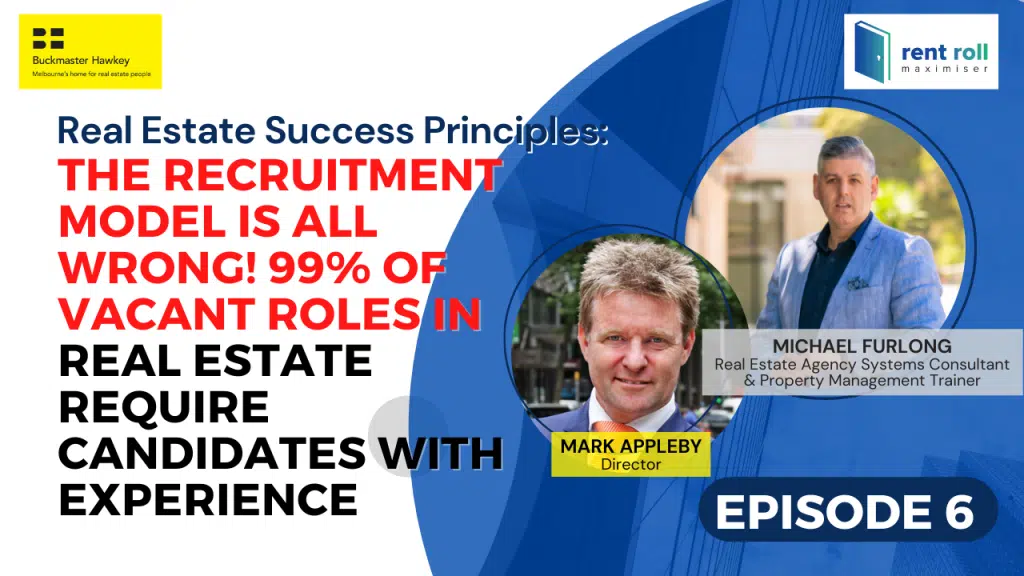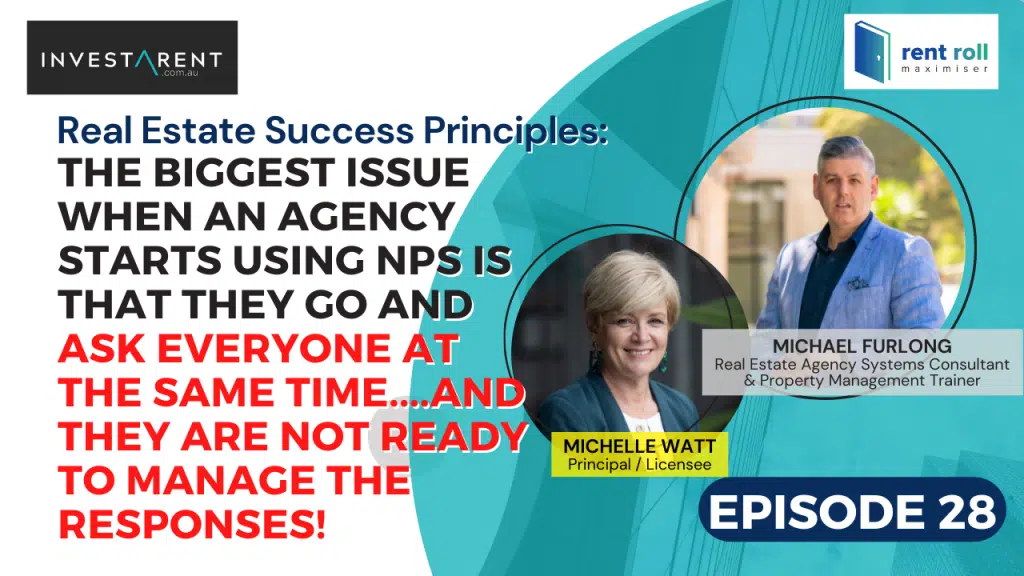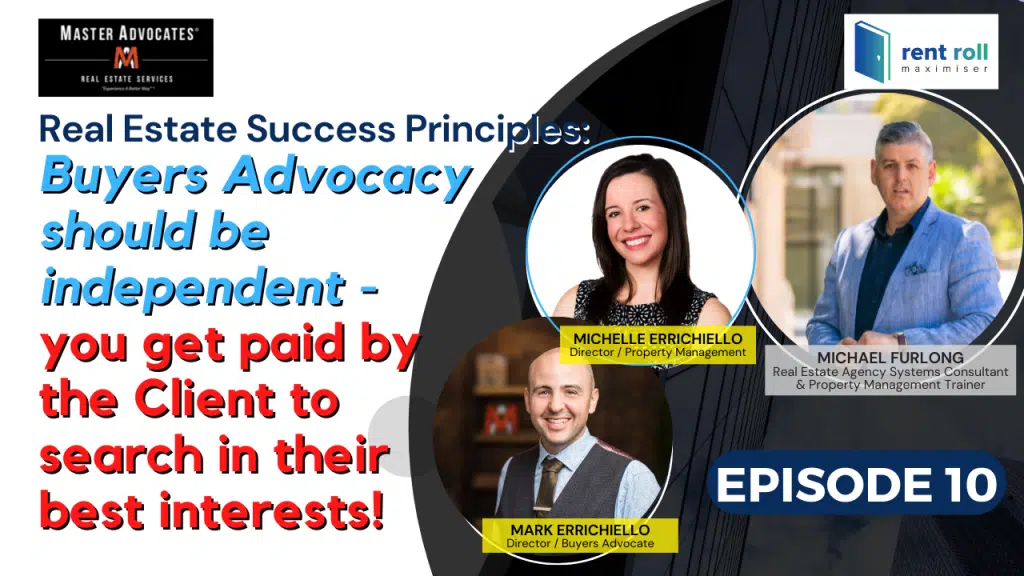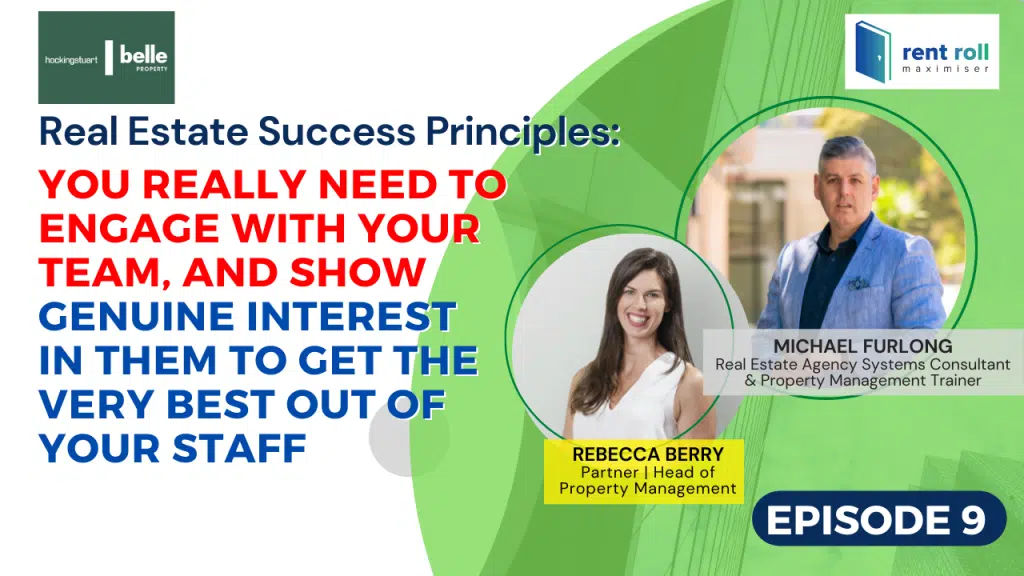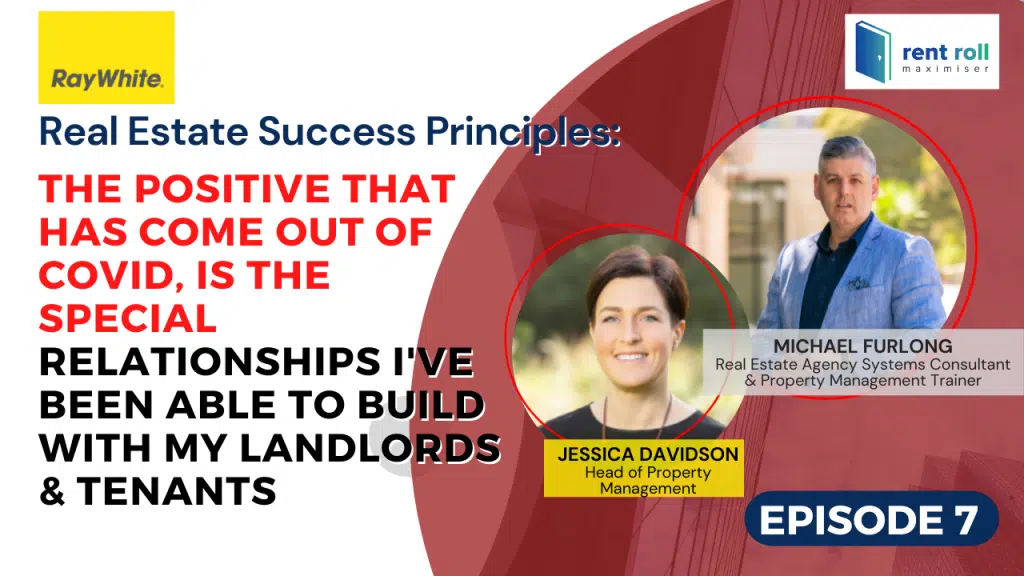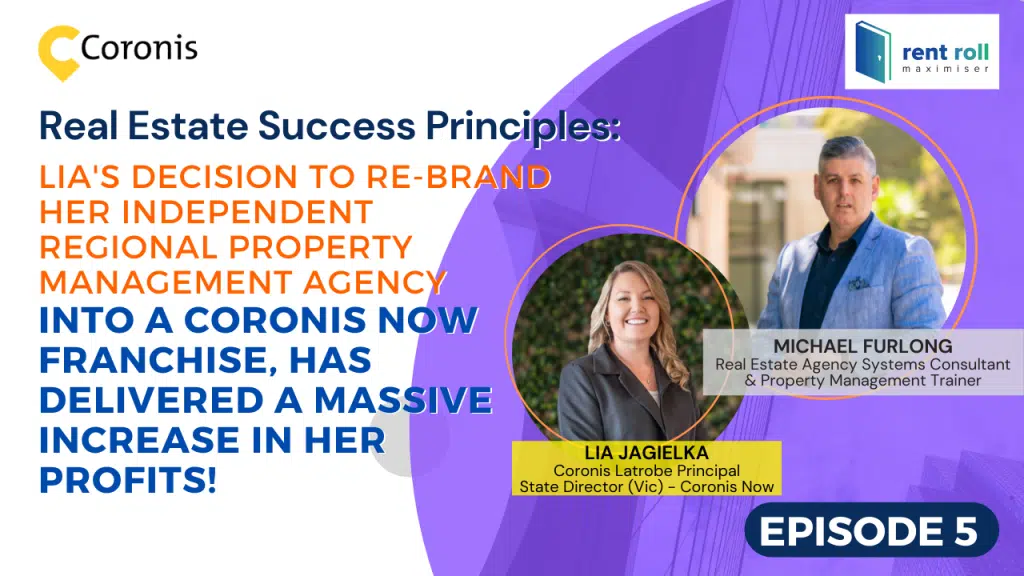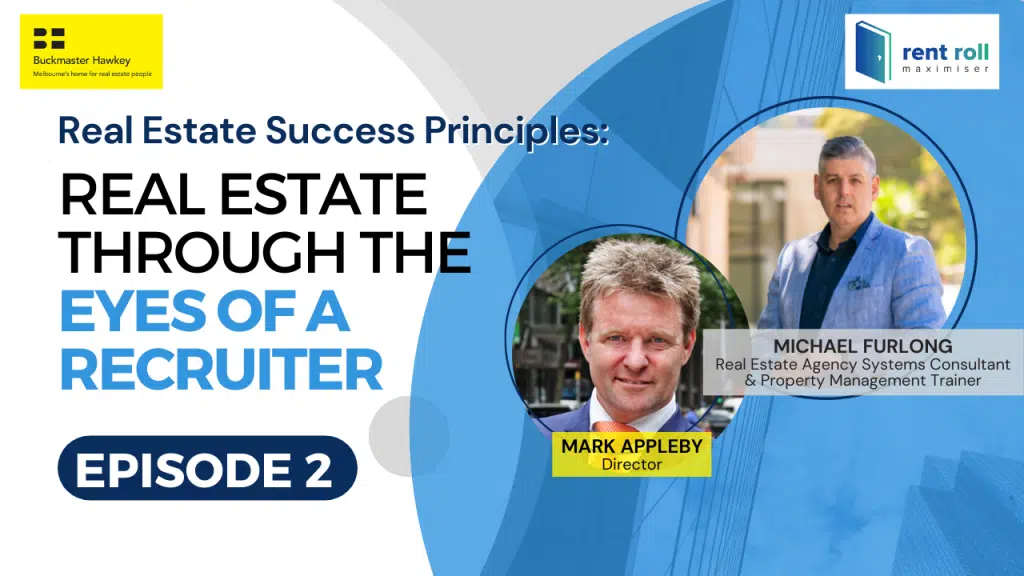Youtube: Real Estate Success Principles – Episode 06
The Recruitment Model is all wrong! 99% of Vacant Roles in Real Estate require Candidates with experience
Michael Furlong: Hey guys, Michael Furlong here from Rent Roll Maximiser, and I have the pleasure of having a good catch-up and good chat
We’re running a couple of sessions today around the issue that both Mark Appleby from Buckmaster Hawkey and I have been sharing and talking about for at least 15 years. Mark, Hello and welcome
Mark Appleby: Hi Michael. Thank You for having me
Michael Furlong: My pleasure, my friend, and that issue that we’re talking about is Staff issues that the Real Estate sector is facing.
Let’s talk really more around Melbourne, Victoria, because that’s where we’re both based, but I would imagine this is Australia-wide
Where there’s an issue at the moment with Property Managers, Sales, all Staff in the industry. It’s pretty tight at the moment if you’re an Agency Principal
Mark Appleby: absolutely. Particularly some skillsets more than others, Michael
Michael Furlong: Mark, tell me a little bit about your business. You’re a Recruitment Agency, is it an Agency, a Company, how do I describe it best?
Mark Appleby: Yes, Agency is the best way to describe it, because we have, like Real Estates, we have Client and Candidate, that we’re the conduit in the middle
Agency Recruitment is what Buckmaster Hawkey does to cover Temporary Appointments, Permanent and Contract.
Michael Furlong: so, you’re working solely in the Real Estate sector. You don’t vary from that. We chatted about that. Mark, let’s talk about permanent Staff for now.
Let’s just say I had the Agency and I needed either a Salesperson, an Admin, Reception, Property Management is probably one that you would recruit the most
But if I was looking for those, why wouldn’t I simply just place an ad on SEEK and do it all myself and save paying somebody else?
What’s the benefits of bringing in a Recruiter?
Mark Appleby: Great question. Firstly, putting an ad on SEEK and doing it yourself, Michael, is only targeting the active job seeker, so that’s somebody who’s in the market that’s looking at SEEK ads on the day.
The second point being, by engaging a Recruitment Agency like ourselves, you’re accessing a database of Candidates, which is made up of active job seekers and passive.
So those passive ones are people that might come to us who aren’t desperately unhappy, register and give us the career wishlist and say, “Hey, look, when you’ve got a role that meets A, B and C, I’d like to hear from you”
So, you’re actually accessing that as well as us casting the net through all the other methodologies that we use to source Candidates.
I think the third point is, particularly in a Candidate-short market, Michael, if it was Candidate-rich, then the need for a Recruiter would be less because you’d have more success in your SEEK ad
Attracting, perhaps, a handful of suitable Candidates that you could then sort the wheat from the chaff and make the successful hire, but the harder the skillset is to hire for, the more a Recruiter comes into play
Michael Furlong: Now, Mark, you’re talking about a Candidate-rich environment. How long have you been in this game?
Mark Appleby: 20 years, Michael
Michael Furlong: I’ve been in Real Estate 20 years. When does that actually happen? That Candidate-rich environment, because it’s never happened while I’ve been in
Mark Appleby: I’m yet to see it, Michael. I think the only role we could actually probably say where it might be a situation is if it’s an entry-level position where a Client is happy to take someone on with zero experience
Michael Furlong: that’s really part of the problem, isn’t it? We’ve spoken about that numerous times. I think you were telling me some numbers when we chatted just recently.
So let’s just talk about Property Management roles. How many Property Management roles do you have at the moment on your books?
Mark Appleby: Permanent roles, at the moment, we’ve got 30 Portfolio Manager roles
Michael Furlong: How many of those, as a key selection criteria “experienced”?
Mark Appleby: 99%
Michael Furlong: I rest my case. I rest my point. It’s silly isn’t it?
We’re in an industry where we want people to be experienced, but unfortunately, we don’t want to train them, and then when they come along, they’ve got bad habits, we want those to be trained out, the whole model just doesn’t work.
You’re in the same line of work that I’m in, Mark, and that is that I work in the space of helping Real Estate Agencies build their business.
You work in the space of helping Real Estate Agents when they’ve got a problem. So, I’m working when they’ve got a problem, you’re working with got a problem
We’re in exactly the same space, I don’t think we’re ever going to run out of Clients
Mark Appleby: No, I don’t think we’re going to run out of Clients.
I guess the industry, I think, needs to have a little bit of shift in thinking, which you’ve always been a progressive thinker yourself, Michael, when I recruited for you at MAP
The program that you and I are working on, hopefully will largely address that.
it’s an age-old problem, particularly a shortage of Residential Property Managers, even Commercial, which in my 20 years of recruiting it’s only really got worse.
And there’s a number of reasons for that, which I’m happy to share now, if you would like.
Michael Furlong: well, maybe we’ll talk about that in a little bit. Tell me a little bit about so from a Candidate point-of-view, that’s probably what I want to get my head around right now.
So, from an Agency point of view, I can understand why they would be using a Recruiter, but why do they use you?
Is it because of relationships? Is it marketing, Google? How do you get yourself out into the industry?
How do you pick up your Clients?
Mark Appleby: It really comes back to the Founders of the Company. The style of recruitment that they have always subscribed by and I was mentored through, Michael, which is a consultative style of recruiting.
Not just flicking resumes and hoping it sticks. So, that’s got a lot to do with it.
And, largely, because they have brands being in Melbourne for 40 years, there’s still Business Owners out there, they’re mature now, but they have known us for years.
I think our numbers have been in their mobile phone for years. A lot of our business were in the fortuitous position, just walks through the door or phones through the front, through the telephone system.
Our brand and our reputation is what gets a lot of repeat business in some of these relationships. I’ve got a number of very good Clients that I’ve recruited for.
But Buckmaster Hawkey’s first Client from 1981 is still one of our major Clients 40 years later
Michael Furlong: That’s unbelievable. Isn’t it? Same Principals?
Mark Appleby: Same Principals
Michael Furlong: Back in 1981, it was the same Principal that used you then?
Mark Appleby: Yes
Michael Furlong: And they’re now still using you?
Mark Appleby: Absolutely. We know their business and their culture inside out. So that hopefully that addresses your point about why us.
Michael Furlong: And it’s important, Mark. I’ve been in a strong advocate of Buckmaster Hawkey, but probably I’m not really a big one for brands. It’s the people behind the brand.
I’ve been a strong advocate of yours for many, many years because you’ve invested the time to try and find out about where I was heading in my Agency, and what the direction was and what sort of Candidate would fit and not fit.
There are just some Agencies that are just not good business. You just wouldn’t take them on because at the end of the day, you’re also representing the Candidate as well.
So, there’s a foot in both camps?
Mark Appleby: Absolutely. We’re career advocates for our Candidates. We like to align ourselves as career partners with Candidates. Not just grab your resume, flip it all over Melbourne and hope it sticks
Like we do with our Clients, we do the same with our Candidates, with regards to understanding their career aspirations. What’s important to them about Company, culture, size of Company, technology, dollars, location, all those things.
You need to ask questions and listen as a Consultant to understand that. So, then when you’re placing a Candidate responsibly, you can put them into an environment that you’ve matched up with your Client
Michael Furlong: So, tell me a little bit about what makes you different, and we’ve talked a little bit more about your relationships, your longevity.
What is it that you do differently?
If I’m a Principal, why would I use you? And would, I guess the next question, be using you exclusively?
Would I just come to you and say, “Mark, I’ve got this job. You’re now my go-to”, or am I trying to handle it myself? Or am I shopping it out to five Recruiters?
How does that work?
Mark Appleby: It’s a little bit like Real Estate in that an open listing for a property for sale, Michael, is not overly popular.
For us, exclusive is the way that we prefer, but then having said that in some extreme Candidates’ short skillsets, Michael. We don’t even ask for exclusivity because if we can’t deliver, we don’t want to put ourselves in that position.
We may ask for a short period of time in order to tip our database upside down, give it a rattle over, say, the course of a few days. Go back to the Client, say “Yes, we’ve got someone”, “No, we don’t”
We try to work with our Clients as a Partner, and why they would use us rather than field it out to five other Agencies. Those other Recruitment Agencies, I can’t account for how those Consultants operate.
I can only account for how we do, which is a thorough consultative process with our Clients.
We don’t send resumes, we talk to our Clients about people. I think a lot of our Clients resignate with that, and that’s a difference that they like, they know that they like the fact we like them.
They liked the fact, if we don’t have anyone suitable, we’ll tell them that. We don’t just send them a Candidate or a resume for the sake of sending them a Candidate.
The whole point of why as an Agency Principal – Real Estate will engage us is they’re busy in their day, they’re good at what they do.
If they brief us to act as their Partner to find them Staff and we understand the types of people that work. Then we’re only putting Candidates in front of them that are in keeping with what they’ve asked for
Michael Furlong: If I was a Real Estate Principal, and I was looking for a new entry level, the issue that would probably be bugging me would be the fact that I’d be inundated with applications.
I’ve got to sort through it all. So, there’s a lot of time wasted. The other end of the spectrum is that if I’m looking for a specific role or a Senior role, you couldn’t find them
You’re in the process of, you’re saying you have a Candidate database, but you’ve also got a Client.
So, you’re really matchmaking the two from a cultural fit, a vision, a training, an environment. Cause that’s, that’s really important now, isn’t it?
Mark Appleby: Very, it is. I mean, culture is King, Real Estate is a people industry, as is recruitment. The only difference between our two industries is the commodity.
In Real Estate, it’s houses, it’s property, in recruitment, it’s people. With Real Estate, being a people-orientated industry culture is King almost more so than the experience of the Candidate, that fit Michael, is critical.
That’s another big reason why, we take the time when we meet our Clients to understand what it is to get that match right.
Hence, why we’ve had repeat business and lot of Clients for years because we get it right, or if we don’t have someone, we don’t waste the Client’s time, putting people in front of them that are inappropriate. So, it’s critical.
Michael Furlong: How much responsibility do you take on board that you’re also matchmaking from the Candidate’s point of view?
That you’re advocating culture and environment and skillsets of the job, you sort of would take that on board as well.
Mark Appleby: Absolutely. When we interview a Candidate, Michael, I call it their wishlist. And we go through and we build it.
Before we talk about any job roles, specific roles we want to hear from a Candidate what’s important to them rather than us to sell them a job.
You have to ask questions, and every Candidate has different motivating factors depending on where they are at with their career and what’s important to them.
So, you have to ask questions to understand that.
So, a good interview for us can be anywhere depending on the experience of the Candidate, anywhere between, you know, 30 minutes to 60 minutes.
They go through an interview process, and once we’ve got that understanding, then information’s recorded on our software available to all our Consultants.
If any of our Consultants are looking at that Candidate’s file, they can access what’s important to that Candidate. If they’ve got a role they’re recruiting for, give the Candidate a call and then start talking to them about it
Michael Furlong: Mark, my understanding of your business model is you also offer a guarantee when the people first start
It’s important for you to make sure, I use the hand in glove scenario, that the Candidate does fit within that organisation because otherwise it comes back and bites you doesn’t it
Mark Appleby: It does. No Recruiter likes having a replacement on their hands, Michael, but with human beings, you can’t guarantee human beings.
Hence why replacement benefits are a common thing within recruitment fees and Agency practice. The reason for that is, some things can happen after the Candidates start that are beyond anyone’s control foresight
That may not have been able to have been unearthed through the recruitment process.
An example of that is somebody might’ve started with you, Michael, and two weeks later, they’ve got a parent in Queensland that gets cancer.
They have to resign and go. Now there, it’s impossible to foresee that prior to the hire actually happening. The replacement benefit there, I call it like insurance for our Client
Beause some Clients say to me, “Oh Mark. I’d like six-month replacement, not three” because you know, we’re negotiable with how we do our fees and their replacement benefits
So, I say to a Client “Well look, the longer guarantee you want, it’s like having a higher cover in insurance.” So, you pay a higher premium
We’re very negotiable around tailoring our fee structures and keeping with what’s important to a Client about that replacement benefits links or timeframe
Michael Furlong: In the back of my mind before you even said about that, a scenario with the parent and going to Queensland.
One of my Clients, which we were working on together, I did some final interviews and there was a Candidate in there, which I wasn’t overly comfortable with, but the Client decided to go ahead
I was doing some interviews for them and, they were there for four days, the Candidate was four days and then all of a sudden, his Mother-in-law in Singapore was diagnosed with cancer.
The family had to then drop and go. He gave 10 minutes notice on the way to the airport. They were going, they were dropping the keys off and said,
“I’ve been here for four days, but I’m no longer able to do it. Here’s the keys, here’s the phone. See you later”
Mark, I’m sure you’ve got lots of stories like that.
It’s been an absolute pleasure chatting with you today, Mark.
www.Buckmasterhawkey.com.au is the place to find you?
Mark Appleby: that’s the place Thank You, Michael. Thanks for your time
Michael Furlong: Thank You very much my friend. Bye for now.
